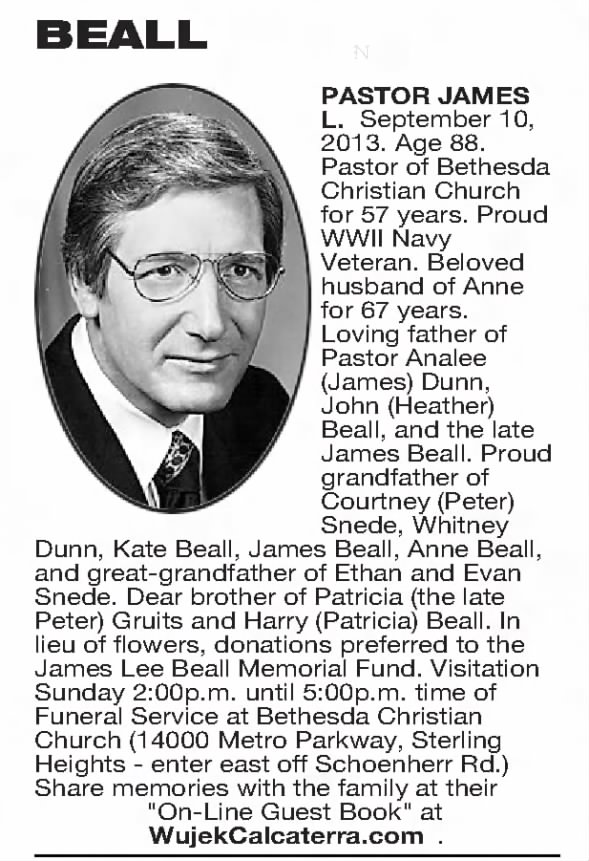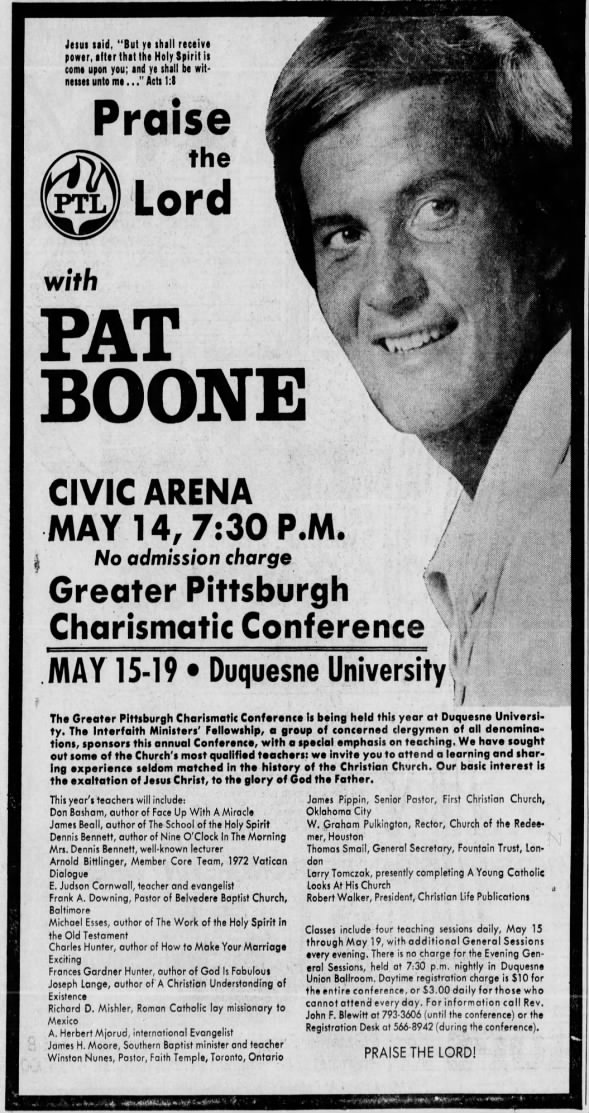 |
| James Beall on the cover of Pathfinders |
The senior pastor of Bethesda Missionary Temple in Detroit, Michigan, James Lee Beall is well-known across the country as a leader in the Pentecostal/Charismatic movement. Bethesda is an excellent example of a powerful, life-filled, non-denominational local church.
Before the New Year Brother Beall responded to a series of questions from the Pathfinders staff. Here are his answers:
Pathfinders: Tell us about Bethesda Missionary Temple: how did it start and how did it develop to what it is today?
Beall: Bethesda Temple began as a Sunday School for children. The church was opened by my mother almost 50 years ago in a small store building. It had a very meager but happy beginning. My mother had a great gift for communicating the Word of God to others, and especially so to children. Once she started the work, adults began to demand that she teach them, too, and we were off and running. The church gradually grew through the years - in fact there hasn't been a year in our total history that we have not experienced good, solid and progressive growth. It has developed through the years until now it is a congregation of somewhere between 3000 and 4000, with a full elementary and high school and a good training program for adults on almost all levels. We are a city church that touches the whole community. In fact, we have just purchased 92 acres of land to eventually rebuild the church and expand it to meet the needs of a growing congregation.
Pathfinders: What has been your observation of the Charismatic renewal - its strengths and weaknesses?
Beall: I have observed the Charismatic renewal as something good. Personally, I have appreciated the Charismatic movement because it has opened up a broader scope of ministry to me. It has been my opportunity and privilege to meet men and women of all backgrounds, of various denominations, under varied and different circumstances, and it has stimulated me. When the Charismatic movement began I was so pleased that the fresh winds of the Holy Spirit were blowing us into one another's camps. It is so easy for us to get stagnant and opinionated and only travel with people who are saying words the way we say them. We need the broad expression of many minds and many viewpoints. This is what gives us balance.
I feel one of the weaknesses of the Charismatic movement is that it has become faddish. First it took off on demonology, and then on women's covering and discipleship and one thing or another. We are always weak when we do not keep in balance with the total Word of God. I feel that the Charismatic movement became weak because many of the leaders left the local church and got out of touch with people as they really are and where they live. The meetings became dinner meetings and meetings in retreats and colleges, and took people out from under the umbrella of the local church where they live.
Its strengths were in the fact that we could minister to one another and speak with one another without the antagonism of denominationalism. We could cross denominational lines and enjoy the work of the Holy Spirit without getting tangled or fixed in a particular denomination.
Pathfinders: To what degree has the phenomenon of autonomous local churches been part of the Charismatic renewal?
Beall: It seems to me that any time there is a renewal or a new spiritual movement there are many people who are simply not able to abide in their past denomination any longer. They have received something different and new that the denominational body simply cannot absorb, and so it is necessary for them to come to the parting of the ways. I think there is also another facet here that when God begins to move and we become spiritually alive we are led back to the Scriptures. A study of the Scriptures, especially the Book of Acts, brings us to the conclusion that the Lord wants the church to be autonomous and to have its own minsters and develop its future ministries within the ranks of the local church. So much of the building of denominationalism is superfluous, expensive and unnecessary.
Pathfinders: What difficulties did you experience when you went from a denominational church to an autonomous local church?
Beall: Well, first of all you don't know where to go for fellowship. The whole idea of fellowship has been so arranged for you that you know the people within your ranks and gravitate toward them. So, fellowship is probably the first anxiety. And then you suddenly come to the realization that you need supplies and teaching materials and you wonder where you'll get them. This was probably one of our major considerations when we became an independent local church - where will we get our Sunday School material? Who will do the writing if we need to produce our own? And on and on we go. Now, where will we turn to in the matters of discipline? Whom will we call when we need ministry in the pulpit? Must we go and investigate everyone personally? And the whole ball game takes on entirely different rules.
Pathfinders: What extra safeguards are needed in the non-denominational church?
 |
| James Beall's mother Myrtle |
Pathfinders: Do you think leaders with the heart of a true shepherd will help to protect the local church against imbalance?
 |
| Beall's book on pastoring |
Pathfinders: How have you maintained strength and balance in the church in Detroit?
Beall: I think in a sense I have already answered that. A long time ago I had to come to grips with what God was really like. Jesus had to come in the Incarnation to show us what God was like in terms we could understand. Jesus put a face on God. We had to look into a human face in order to know love, compassion, care, and all of the other things. The same is true with the Holy Spirit. Jesus gave content and depth to the Holy Spirit. He said, "When the Holy Spirit is come he will be another comforter." The word "another" is the key word there. A comforter just like me, a comforter who is like me in character, in temperament, in attitude, in viewpoint, and in expression. The Holy Spirit is not somebody different than Jesus. The Holy Spirit and the Spirit of Jesus are synonymous: they are one in the same. I can trust myself into the hands of the Holy Spirit if the Holy Spirit is like Jesus, and he is. This is where we get the imbalance by going back and trying to pick up all of the Old Testament types and shadows. I have a great deal of difficulty with those who want to deal with the Davidic plan of worship. The church plan of worship is not the Davidic plan of worship; it is the worship that is on the pages of the New Testament. And taking one scripture out of Acts chapter 15 and building an elaborate system of worship on the rebuilding of the Tabernacle of David only causes us to deal with a lot of conjecture and guesswork. We guess about the tunes, we guess about the way the tunes are sung, we guess about the way the instruments were used, we guess about whether we dance or not. I have no objection to people dealing with conjecture as long as they call it that. But they get out of balance when they start saying, "This is the doctrinal way to do things, and in order to be accepted you must wear this badge." Badge wearing always brings us into imbalance and disunity!
Pathfinders: What pastoral advice would you give pastors who are beginning a new, non-denominational, Charismatic church?
Beall: My advice to them would be to go slow and preach what you know. Like John said in his first epistle, "We preach what we have seen and hear and what our hands have handled of the word of life." I think that too many people are dealing with theory, things that are impractical, and then we wonder why they don't go over. Some of these new fellows should never preach anything but being born again, and preach that message until they know it. Many people preach the baptism of the Holy Spirit but never get anybody baptized because it's all theory. The same is true with healing. If we try to duplicate what we hear other people preach, but it hasn't worked its way into us, it won't work. We must be partakers of the fruit and then we can preach it. I would say to young preachers, don't try to say too much too soon and don't try to grow too quickly. A good, well-planted tree will grow of its own accord and by its own natural ways. Too many people are trying to get the church involved in "dynamic church growth," and it is snuffing out their life. Enjoy the journey as well as the destination.
* * *
Books by James Lee Beall -
The School of the Holy Spirit
Let Us Make Man
Rise to Newness of Life
The Adventure of Fasting
Strong in the Spirit
How to Achieve Security, Confidence, and Peace
Your Pastor, Your Shepherd
Laying the Foundation: Achieving Christian Maturity
Straight Talk about the Holy Spirit
 James Lee Beall obit Thu, Sep 12, 2013 – Page A10 · Detroit Free Press (Detroit, Michigan) · Newspapers.com
James Lee Beall obit Thu, Sep 12, 2013 – Page A10 · Detroit Free Press (Detroit, Michigan) · Newspapers.com |
| From the July/August 2018 edition of Ministry Today magazine |
 May 1973 - Greater Pittsburgh Charismatic Conference 13 May 1973, Sun The Pittsburgh Press (Pittsburgh, Pennsylvania) Newspapers.com
May 1973 - Greater Pittsburgh Charismatic Conference 13 May 1973, Sun The Pittsburgh Press (Pittsburgh, Pennsylvania) Newspapers.com |
| From the April 1975 edition of VOICE magazine |






Pastor Beall ministered to me, a tired broken Baptist pastor, and God filled me with a new confidence in Christ. Thank God for this man. Andrew McMillan. www.fepaisa.com
ReplyDelete